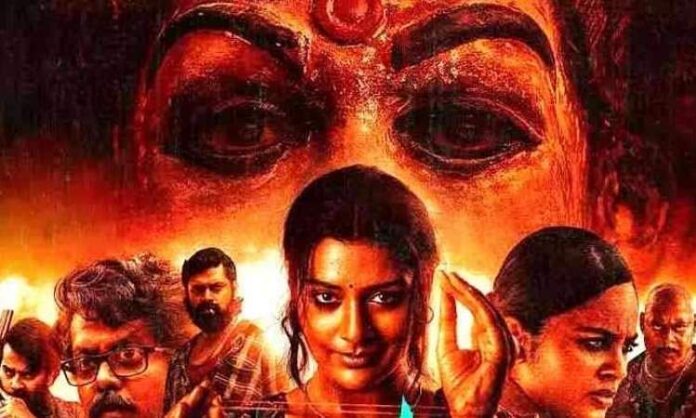Early on in Mangalavaaram, a boy tells a girl that she looks like a sky filled with dark clouds when she wears kohl. Later, there is a woman telling someone that she makes do by “staring at stars in the sky” when her husband isn’t around. A well becomes a bookended metaphor for life and death. VFX butterflies are symbols of incandescent, fleeting pleasure. Decency is but a guise for infamy, and there is always more than what meets the eye when rumours fly thick and fast. In a film characterised by a lack of subtlety, these are the touches of sincerity and satire coasting through a largely unlikeable and somewhat puzzling experience.
Director – Ajay Bhupathi
Cast – Payal Rajput, Ajay Ghosh, Ravindra Vijay, Nanditha Swetha, Chaitanya Krishna, Divya Pillai
Throughout the film, Mangalavaaram manages to be about the villagers as much as it is about the crimes they commit and subjected to. A quick prologue/foreshadowing later, we open to a village in coastal Andhra where hive mind reigns supreme. A wall filled with salacious slander turns into a proverbial death note. Investigations held by a new detective are derailed and reluctantly resumed. We rarely get to figure out whether these deaths are the handiwork of a mortal or the supernatural because we are quickly shuttled away to consume a set of purportedly ‘massy’ sequences. I do not use the word consume lightly here, for consumption is what takes precedence over experience in the first half of the film. Having watched the entire film, it is safe to say that the makers only had a sliver of a story before its interval block, where Payal Rajput’s Shailu makes an entry. Till then, we are subjected to scenes with bizarre shot composition and a near-assaulting background score. It isn’t hard to guess why B Ajaneesh Lokanath, the music composer of Vikrant Rona, Kantara and the more recent Virupaksha, has been roped in to score Mangalavaaram, but this is a rather deceitful use of his repertoire. Credit where it is due, the townspeople’s interplaying obsession with sex and morality is effectively established in the film’s first half, but it feels like an incomplete win. It is not just the excessive exposition, the TV soap level sentimentality, a Thallumala-coded absurd brawl, and Ajay Ghosh’s tasteless dialogues that bring down the film. It is also the embarrassment and woe that creeps up when you learn what filmmakers think passes off as good storytelling. Why does a film set in the 90s have scenes edited like instagram reels? Why, for the millionth time, are dolly zooms abused in mainstream cinema? It is hard to escape a litany of post- production choices that feel all too much like damage control.
Mangalavaaram’s second half fortunately introduces us to a more coherent narrative. There are answers, which involve an illness rarely spoken about in cinema. There is social commentary on how a society that cannot move beyond menstrual taboos, can ever understand a more specific form of female trauma. There are pay-offs, one of which involves a reunion of long-lost loves. It is a relief to watch this, when compared to what preceded it. But it is not without its own set of limitations. With a meaty flashback entirely dedicated to a woman, it feels sad to watch it all flow to the redemption and revenge of two men. It did not sit well to watch a woman get a lot of the story, but very little say. Shailu is crudely framed as the object of desire even when she is traumatised. Shailu’s character is somewhat similar to what Sukumar did in Kumari 21F (2015) and Oo Antava Oo Oo Antava — where a woman is shown to subvert the veneer of pleasure by being the very embodiment of it — but I am not sure if it is the most likable way of convincing men to look beyond the Madonna-whore complex.
Contrary to what we have been asked to expect as viewers, there are no supernatural elements in Mangalavaaram. But there is some horror for sure, intentionality notwithstanding. One involves walls with anonymous messages and crowds surrounding it, which quickly reminds one of the cancel culture on social media. Another involves me walking out of yet another film that treats its audience as attention-withdrawing ATMs and not as sentient individuals who possess the capacity to think for themselves and engage with a film on its own merit.
#Engaging #cost #Cinema #express

